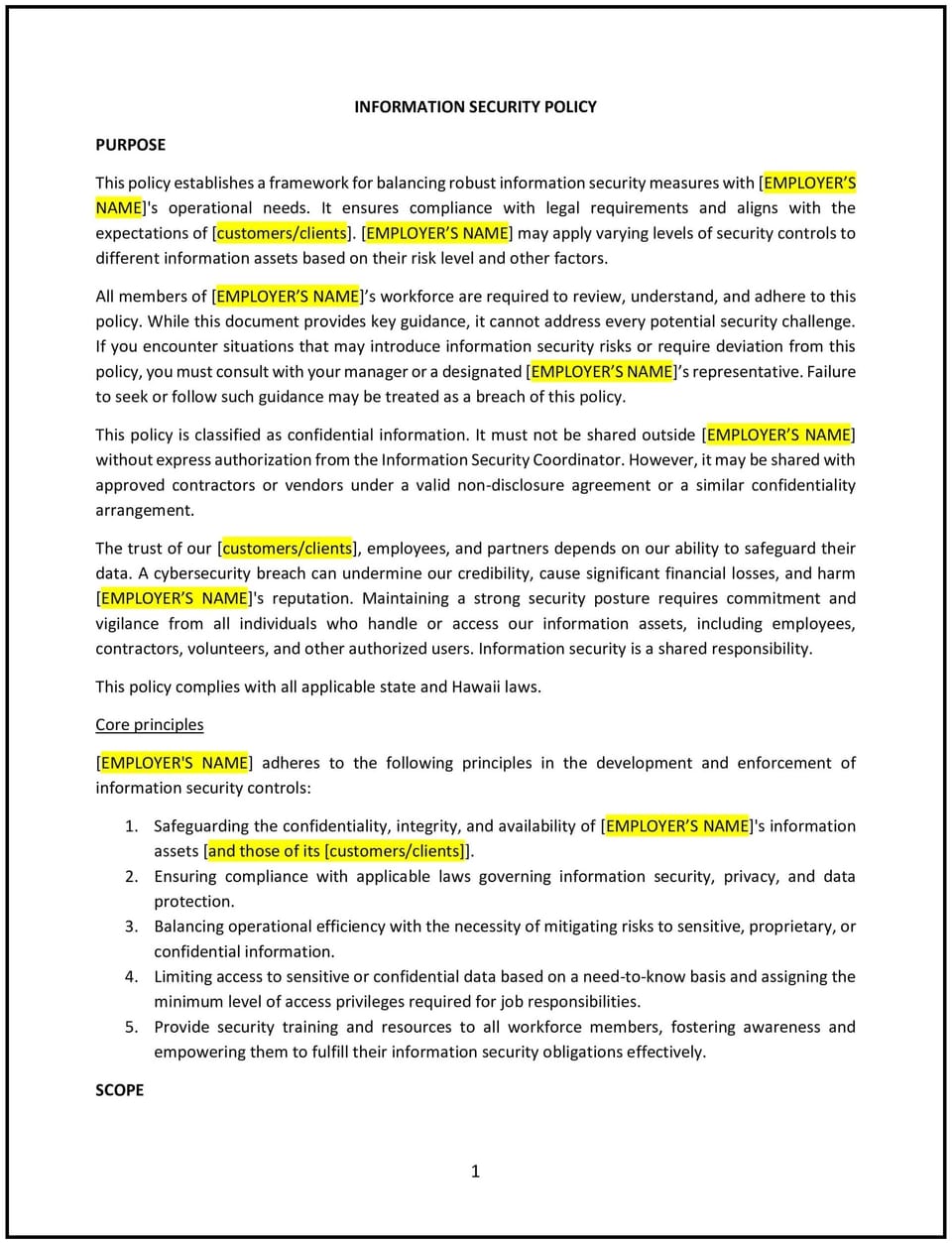Information security policy (Hawaiʻi): Free template

Information security policy (Hawaiʻi)
An information security policy helps Hawaiʻi businesses establish guidelines for protecting sensitive data, such as customer information, employee records, and intellectual property, from unauthorized access, breaches, or cyber threats. This policy outlines procedures for safeguarding digital and physical information, addressing Hawaiʻi’s unique business environment and cultural considerations. It is designed to promote data integrity, confidentiality, and availability while supporting business operations and customer trust.
By implementing this policy, businesses in Hawaiʻi can reduce the risk of data breaches, protect their reputation, and demonstrate a commitment to safeguarding sensitive information.
How to use this information security policy (Hawaiʻi)
- Define information security objectives: Clearly outline the goals of the policy, such as protecting data integrity, ensuring confidentiality, and maintaining availability.
- Identify sensitive data: Specify the types of information that require protection, such as personal data, financial records, or proprietary business information.
- Establish access controls: Provide guidelines for managing access to sensitive data, including password policies, multi-factor authentication, and role-based permissions.
- Implement security measures: Outline procedures for securing data, such as encryption, firewalls, and regular software updates.
- Address physical security: Include measures for protecting physical records and devices, such as locked filing cabinets and secure disposal of sensitive documents.
- Train employees: Educate staff on the policy’s guidelines, including how to handle sensitive data, recognize phishing attempts, and report security incidents.
- Monitor compliance: Regularly review security practices to ensure adherence to the policy and address any vulnerabilities promptly.
- Communicate the policy: Share the policy with employees during onboarding and through internal communications to ensure awareness and understanding.
- Review and update the policy: Regularly assess the policy’s effectiveness and make adjustments as needed to reflect changes in technology, threats, or business needs.
Benefits of using this information security policy (Hawaiʻi)
This policy offers several advantages for Hawaiʻi businesses:
- Protects sensitive data: Clear guidelines help prevent unauthorized access, breaches, or misuse of sensitive information.
- Reduces risks: A structured policy minimizes the likelihood of data breaches, cyberattacks, or other security incidents.
- Enhances customer trust: Demonstrating a commitment to data security builds trust with customers and partners.
- Supports business continuity: Protecting data integrity and availability ensures uninterrupted business operations.
- Aligns with legal requirements: The policy helps businesses comply with Hawaiʻi state laws and federal regulations, such as data protection and privacy laws.
- Encourages accountability: Employees understand their responsibilities for safeguarding sensitive information.
- Improves reputation: A strong information security policy enhances the business’s reputation as a trustworthy and responsible organization.
Tips for using this information security policy (Hawaiʻi)
- Communicate the policy effectively: Share the policy with employees during onboarding and through regular reminders, such as emails or training sessions.
- Provide training: Educate staff on the policy’s guidelines, including how to handle sensitive data, recognize phishing attempts, and report security incidents.
- Use technology: Implement security tools such as encryption, firewalls, and antivirus software to protect digital information.
- Monitor compliance: Regularly review security practices to ensure adherence to the policy and address any vulnerabilities promptly.
- Be transparent: Clearly explain the policy’s purpose, benefits, and expectations to employees to build trust and cooperation.
- Review the policy periodically: Update the policy as needed to reflect changes in technology, threats, or business needs.
Q: Why should Hawaiʻi businesses adopt an information security policy?
A: Businesses should adopt this policy to protect sensitive data, reduce risks, and demonstrate a commitment to safeguarding information.
Q: What types of data should be protected under the policy?
A: The policy should protect sensitive data such as personal information, financial records, and proprietary business information.
Q: How should businesses manage access to sensitive data?
A: Businesses should implement access controls, such as password policies, multi-factor authentication, and role-based permissions.
Q: What security measures should businesses implement?
A: Businesses should use measures such as encryption, firewalls, and regular software updates to secure digital information.
Q: How should businesses handle physical security?
A: Businesses should protect physical records and devices with measures such as locked filing cabinets and secure disposal of sensitive documents.
Q: What training should businesses provide to employees?
A: Businesses should educate staff on the policy’s guidelines, including how to handle sensitive data, recognize phishing attempts, and report security incidents.
Q: How often should the policy be reviewed?
A: The policy should be reviewed annually or as needed to reflect changes in technology, threats, or business needs.
This article contains general legal information and does not contain legal advice. Cobrief is not a law firm or a substitute for an attorney or law firm. The law is complex and changes often. For legal advice, please ask a lawyer.


